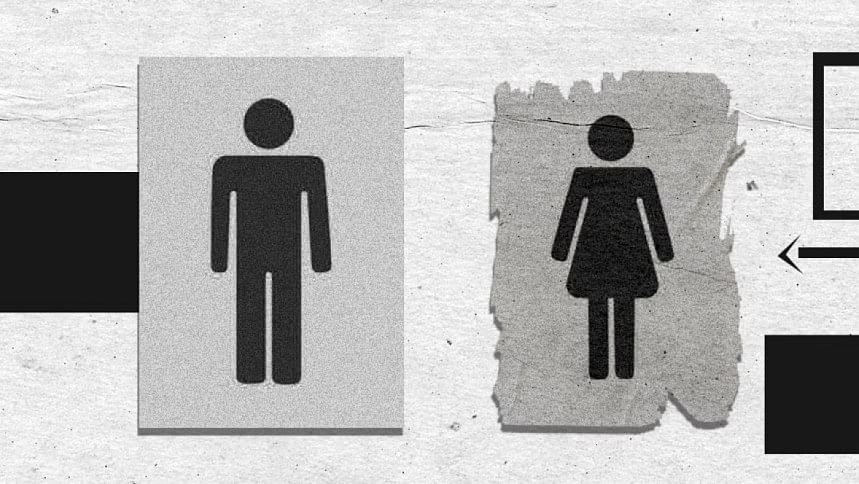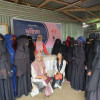How female-friendly are our office restrooms?

Shayla, a government employee based in Jashore, only drinks half a litre of water throughout her 9am-to-5pm work shift, so that she does not have to urinate frequently, because there isn't a dedicated restroom for female employees in her office. The one it does have is shockingly unusable. "When I went to the restroom on my first day of work, I was on the verge of passing out seeing how filthy and unkempt it was. In order to avoid having to use the restroom, I don't even have tea or coffee," She said in despair.
Given that women are more than 42 percent of Bangladesh's labour force, it is unfortunate that even in 2024, separate restrooms for women are still not the norm in many workplaces in Bangladesh, especially government offices. But it is essential that women have their own restrooms considering their privacy, not to mention hygiene since their menstrual cycles require different hygiene practices. When menstruating, women who don't have access to private restrooms at work might be compelled to relinquish their wages and hours of work which may result in an adverse impression of the workers as "unreliable" or "irresponsible," which limits opportunities for promotion.
The difficulties that menstruating girls and women face stretch beyond a simple lack of supplies or infrastructure. While menstruation is a normal and healthy part of life, in many societies, menstruating women's experiences remain strained by cultural taboos and discriminatory social norms.
Mithila, who is a government banker based in Sherpur, said it was extremely tough for a woman to work at a bank from 10 am to 6 pm without having a dedicated female restroom. "It is sometimes awkward to use the shared restroom with our male coworkers, and because there isn't even a covered rubbish bin, it is difficult to dispose of sanitary products when you're menstruating," she said.
Separate toilet facilities at work provide women with a space that prioritises their privacy and dignity. In shared facilities, women's specific hygiene needs may not be adequately addressed. Designing separate facilities allows for the inclusion of amenities like sanitary napkin disposal bins. Recognising and addressing the specific needs of female employees contributes to their overall well-being, job satisfaction, and productivity. It conveys favourably about the organisation's dedication to inclusion and diversity as well.
The United Nations General Assembly formally acknowledged water and sanitation as an essential human right by passing Resolution 64/292. The Bangladesh government has acknowledged it as a basic right in a number of initiatives as well. According to Sustainable Development Goal 5 (Gender Equality), companies that provide staff separate restrooms and changing areas help to achieve SDG 5.1, which calls for the abolition of all forms of discrimination against women and girls worldwide. SDG 6: Clean Water and Sanitation is achieved by businesses providing staff with separate restrooms and changing areas. It also aims to end open defecation and provide everyone with access to adequate and equitable sanitation and hygiene by 2030, giving special consideration to the needs of women, girls, and those in vulnerable situations.
Female labour force participation rate in Bangladesh has increased significantly over the decades. It has increased to 42.68 percent in 2022, up from 36.3 percent five years ago. Rural participation of women at work is 50.89 percent and 23.6 percent in urban areas, according to the Labour Force Survey 2022, conducted by Bangladesh Bureau of Statistics. This change in the workforce demographics necessitates a careful evaluation of the facilities and infrastructure to guarantee inclusivity and comfort for all workers. There are many obstacles ahead for our recently formed government. It would be praiseworthy if the government could devise certain initiatives to address this overlooked issue, making sure that these initiatives comply with labour laws and workplace facility regulations, with a focus on the significance of gender-specific provisions.
Monira Sharmin is a columnist and research student of post-graduate programme in disaster management at Brac University. She can be reached at [email protected]
Views expressed in this article are the author's own.
Follow The Daily Star Opinion on Facebook for the latest opinions, commentaries and analyses by experts and professionals. To contribute your article or letter to The Daily Star Opinion, see our guidelines for submission.

 For all latest news, follow The Daily Star's Google News channel.
For all latest news, follow The Daily Star's Google News channel. 










Comments